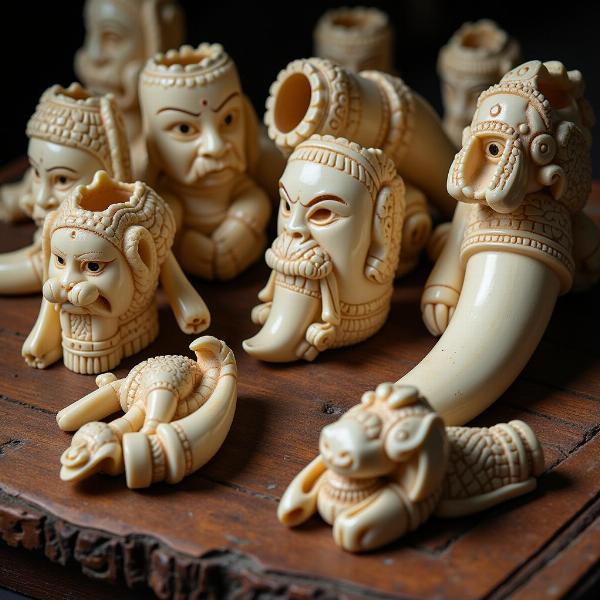Tusks, those magnificent elongated teeth projecting beyond the mouths of certain animals, hold a deep significance in Hindi culture and language. Understanding the meaning of tusks in Hindi goes beyond a simple translation; it delves into symbolism, mythology, and practical uses that have shaped their perception for centuries. This article will explore the various facets of “meaning of tusks in Hindi,” from the literal translation to the cultural implications.
Uncovering the Hindi Word for Tusk
The most common Hindi word for tusk is “daant” (दांत). While “daant” generally translates to “tooth,” it’s often used to refer to tusks, especially in everyday conversation. More specifically, “gaja-dant” (गजदंत), literally meaning “elephant tooth,” is used to denote elephant tusks, highlighting their cultural importance. Other terms like “haathi daant” (हाथी दांत) – also meaning “elephant tooth” – are prevalent. So, whether you’re discussing the majestic tusks of an elephant or the prominent teeth of a wild boar, “daant” and its variations serve as the linguistic foundation.
Cultural Significance of Tusks in India
Tusks, particularly elephant tusks, are revered in Hindu mythology and tradition. Lord Ganesha, the remover of obstacles, is often depicted with a broken tusk, which holds various symbolic interpretations. One popular story narrates how Ganesha used his own tusk to write the Mahabharata, showcasing the association of tusks with wisdom and knowledge. Another interpretation links the broken tusk to Ganesha’s sacrifice and humility.
In addition to religious symbolism, tusks have historically represented wealth and status. Elaborately carved ivory items, made from elephant tusks, were prized possessions of royalty and the elite. This association with luxury further cemented the cultural value of tusks.
Practical Uses and Conservation Concerns
Beyond their symbolic value, tusks serve practical purposes for animals. Elephants use their tusks for digging, foraging, and defense. The illegal ivory trade, driven by the demand for ivory products, poses a grave threat to elephant populations. Understanding the “meaning of tusks in Hindi” also involves acknowledging the urgent need for conservation efforts to protect these magnificent creatures.
Tusks in Idiomatic Expressions
The word “daant” also appears in various Hindi idioms. For instance, “daant dikhana” (दांत दिखाना) literally translates to “showing teeth,” meaning to display aggression or anger. This illustrates how the concept of tusks, represented by “daant,” extends beyond its literal meaning into everyday language.
 Ivory Carving in India
Ivory Carving in India
Conclusion
The “meaning of tusks in Hindi” encompasses a rich tapestry of linguistic nuances, cultural significance, and practical considerations. From the simple translation of “daant” to the profound symbolism associated with Lord Ganesha’s broken tusk, tusks hold a unique place in Indian culture. As we appreciate the beauty and power of these natural wonders, it’s crucial to promote conservation efforts and ensure their survival for generations to come.
FAQ
- What is the Hindi word for tusk? The common Hindi word for tusk is “daant” (दांत), while “gaja-dant” (गजदंत) specifically refers to elephant tusks.
- Why is Lord Ganesha depicted with a broken tusk? There are various interpretations, including Ganesha using his tusk to write the Mahabharata and the symbolism of sacrifice and humility.
- What are the practical uses of tusks for animals? Animals like elephants use their tusks for digging, foraging, and self-defense.
- What is the impact of the ivory trade on elephant populations? The illegal ivory trade poses a severe threat to elephant populations, driving poaching and habitat destruction.
- How does the word “daant” appear in Hindi idioms? “Daant dikhana” (दांत दिखाना), meaning to show aggression, is one example of how “daant” is used idiomatically.
- What are some other words used for tusk in Hindi? Another common term is “haathi daant” (हाथी दांत), literally meaning “elephant tooth.”
- Why is it important to understand the cultural significance of tusks? Understanding the cultural significance helps us appreciate the deeper meaning and value attributed to tusks in Indian society.
Meaning-Hindi.in is a leading Hindi translation service provider offering a wide range of specialized translation solutions, including business and commercial document translation, certified and legal document translation, technical and user manual translation, website and localization translation, educational and academic document translation, express translation, and specialized industry translation. From translating legal documents to localizing your website, our team of expert Hindi linguists ensures accurate and culturally sensitive translations. For all your Hindi translation needs, contact us at [email protected] or call us at +91 11-4502-7584. Meaning-Hindi.in is your trusted partner for bridging the language gap.